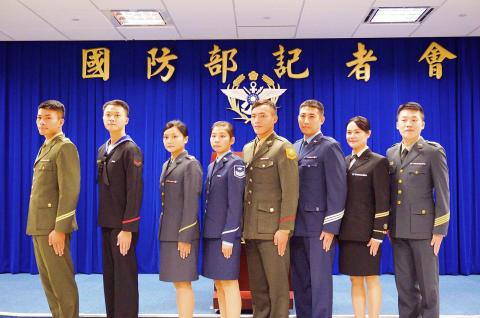The Ministry of National Defense (MND) yesterday reiterated its goal to build an all-volunteer military force by 2018 after Minister of National Defense Feng Shih-kuan (馮世寬) told lawmakers on Monday that conscription would end in 2018.
It is the ministry’s goal to cease drafting citizens into service by 2018, “a goal that has to be worked toward,” said Major General Fu Cheng-jung (傅政榮), director of the Human Resources Division of the ministry’s Resources Management Department.
However, Fu’s comment was more ambiguous than Feng’s, who also said that ending conscription by 2018 was “a decision that should not be changed.”

Photo: Tu Chu-min, Taipei Times
The ministry had previously been more flexible about the deadline for an all-volunteer force.
Fu said that the number of volunteer soldiers and officers has increased steadily in accordance with the ministry’s predictions.
However, he did not give a direct reply when asked whether the military would have to continue conscription should it fail to recruit the necessary number of volunteers.
“The nation’s military service system has not changed, and the draft system and the volunteer system have been developed in parallel,” he said.
The ministry in 2008 announced that it would build an all-volunteer force by 2014, but ended up having to push back its target date for ending conscription several times.
Men born after 1994 are now exempt from one-year compulsory military service, but will still be required to undergo four months of mandatory military training upon reaching conscription age.
In other defense-related news, amid concerns over Chinese military aircraft that have circled Taiwan’s air defense identification zone twice in two weeks, the ministry said the military will confront intruding Chinese military aircraft “fearlessly, without evasion or weakness.”
However, the military’s exact response would vary depending on whether the intruding aircraft appear hostile, Joint Operations Division Director Major General Chung Shu-ming (鍾樹明) said.
The military monitors China’s military maneuvers closely and was fully aware of the two training missions around Taiwan’s airspace, he said.
It opted to deal with the situation in a way that would not provoke conflict, Chung said.
In the event of a Chinese military fleet with reconnaissance capabilities circling Taiwan, the military would impose a strict control over high-tech weapons and other signal-emitting sources to prevent China from accessing sensitive data, Chung said.
As an example of that flexibility, ministry spokesman Major General Chen Chung-chi (陳中吉) said that a live-fire exercise of the Sky Bow II surface-to-air missile system in October at a base in Pingtung County was canceled after a Chinese reconnaissance ship was discovered off the southern coast.
In addition, the military has a humanitarian contingency plan to rescue the crew of Chinese military vessels should an accident occur, the ministry said.
Search and rescue missions would be deployed if Chinese vessels were involved in an accident in areas to the east of the middle line of the Taiwan Strait, Chung said.
China would be in charge of the search and rescue effort if such an accident occurred to the west of the middle line, he said.

Taiwanese can file complaints with the Tourism Administration to report travel agencies if their activities caused termination of a person’s citizenship, Mainland Affairs Council Minister Chiu Chui-cheng (邱垂正) said yesterday, after a podcaster highlighted a case in which a person’s citizenship was canceled for receiving a single-use Chinese passport to enter Russia. The council is aware of incidents in which people who signed up through Chinese travel agencies for tours of Russia were told they could obtain Russian visas and fast-track border clearance, Chiu told reporters on the sidelines of an event in Taipei. However, the travel agencies actually applied

Japanese footwear brand Onitsuka Tiger today issued a public apology and said it has suspended an employee amid allegations that the staff member discriminated against a Vietnamese customer at its Taipei 101 store. Posting on the social media platform Threads yesterday, a user said that an employee at the store said that “those shoes are very expensive” when her friend, who is a migrant worker from Vietnam, asked for assistance. The employee then ignored her until she asked again, to which she replied: "We don't have a size 37." The post had amassed nearly 26,000 likes and 916 comments as of this

New measures aimed at making Taiwan more attractive to foreign professionals came into effect this month, the National Development Council said yesterday. Among the changes, international students at Taiwanese universities would be able to work in Taiwan without a work permit in the two years after they graduate, explainer materials provided by the council said. In addition, foreign nationals who graduated from one of the world’s top 200 universities within the past five years can also apply for a two-year open work permit. Previously, those graduates would have needed to apply for a work permit using point-based criteria or have a Taiwanese company

US President Donald Trump said "it’s up to" Chinese President Xi Jinping (習近平) what China does on Taiwan, but that he would be "very unhappy" with a change in the "status quo," the New York Times said in an interview published yesterday. Xi "considers it to be a part of China, and that’s up to him what he’s going to be doing," Trump told the newspaper on Wednesday. "But I’ve expressed to him that I would be very unhappy if he did that, and I don’t think he’ll do that," he added. "I hope he doesn’t do that." Trump made the comments in